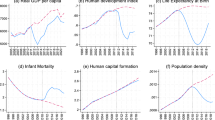Abstract
Dictatorship is the predominant political system in many developing countries. However, different dictators act quite differently: a good dictator implements growth-enhancing economic policies, e.g., investment in public education and infrastructure, whereas a bad dictator taxes her citizens for her own consumption. The present paper provides a theoretical model by deriving underlying determinants of dictatorial behavior. We assume that the engine of economic growth is private investment. It can increase the productivity of individuals who invest, as well as the aggregate technological level. A good dictator encourages this investment in order to tax more. However, the cost of this encouragement is that the ensuing higher growth rate will induce earlier democratization. In this paper we will illustrate the risk of choosing a growth-enhancing policy, while leading to additional tax revenues in the short-run will also increase the likelihood of a revolution resulting in the eventual overthrow of the dictator. Furthermore, we will find that the higher the return from private investments the less likely the dictator will be a good one. Contrary to McGuire and Olson (J Econ Lit 34:72–96, 1996) we find that a long life-time does not always induce positive incentives among dictators.
Similar content being viewed by others
References
Acemoglu D., Robinson J.A. (2000) Why did the West extend the franchise? democracy, inequality and growth in historical perspective. Q J Econ 115(4): 1167–1199
Acemoglu D., Robinson J.A. (2001) A theory of political transitions. Am Econ Rev 91(4): 938–963
Acemoglu D., Robinson J.A., Verdier T. (2004a) Kleptocracy and divide-and-rule: a model of personal rule. J Eur Econ Assoc 2(2/3): 162–192
Acemoglu, D., Johnson, S., Robinson, J. Institutions as the fundamental cause of long run growth. NBER Working Paper No: w10481 (2004b)
Aghion P., Howitt P. (1992) A model of growth through creative destruction. Econometrica 60, 323–351
Barro R.J. (1997) Determinants of economic growth: a cross-country empirical study. MIT press, Cambridge
Barro R.J. (1999) Determinants of democracy. J Polit Econ 107(6): 158–183
Bénabou R. (1996). Inequality and growth. In: Bernanke Ben S., Rotemberg Julio J. (eds.) NBER macroeconomics annual 1996. MIT Press, Cambridge, pp. 11–74
Bénabou R. (2002) Tax and education policy in a heterogeneous-agent economy: what levels of redistribution maximize growth and efficiency. Econometrica 70(2): 481–517
Boix C., Stokes S.C. (2003) Endogenous democratization. World Politics 53(4): 517–547
Bueno de Mesquita B., Smith A., Siverson R., Morrow J. (2003) The logic of political survival. MIT Press, Cambridge
Collins S.M., Bosworth B.P. (1996) Economic growth in east Asia: accumulation versus assimilation. Brookings Pap Econ Act 2, 135–203
Collier P. (2001) Implications of ethnic diversity. Econ Policy 32, 127–166
Cox G.W. (1997) Making votes count. Cambridge University Press, New York
Easterly W., Levine R. (1997) Africa’s growth tragedy: policies and ethnic divisions. Q J Econ 112, 1203–1250
Glaeser E.L., Porta R.L., Lopez-de-Silnes F., Shleifer A. (2004) Do institutions cause growth. J Econ Growth 9(3): 271–303
Grossman G., Helpman E. (1991) Quality ladders in the theory of growth. Rev Econ Stud 58, 43–61
Huntington S.P. (1991) The third wave: democratization in the late twentieth century. Univ. Oklahoma press, Norman
Konrad K.A. (2002) Investment in the absence of property rights: the role of incumbency advantages. Eur Econ Rev 46(8): 1521–1537
Kurzman C., Werun R., Burkhart R.E. (2002) Democracy’s effect on economic growth: a pooled time-series analysis, 1951–1980. Stud Comp Int Dev 37(1): 3–33
Laffont J.-J., Qian Y. (1999) The dynamics of reform and development in China: a political economy perspective. Eur Econ Rev Pap Proc. 43, 1085–1094
Lee W. (2003) Is democracy more expropriative than dictatorship? Tocquevillian wisdom revisited. J Dev Econ 71(1): 155–198
Lucas R. (1988) On the mechanics of economic development. J Monet Econ 22(1): 3–42
McGuire M.C., Olson M. (1996) The economics of autocracy and majority rule. J Econ Lit 34, 72–96
Nelson R., Phelps E. (1966) Investment in humans, technological diffusion, and economic growth. Am Econ Rev Pap Proc 51(2): 69–75
Persson T., Tabellini G. (1994) Is inequality harmful for growth. Am Econ Rev 84(3): 149–187
Persson T., Tabellini G. (2000) Political economics: explaining economic policy. MIT Press, Cambridge
Persson T., Tabellini G. (2003) The economic effects of constitutions: what do the data say. MIT Press, Cambridge
Romer P. (1990) Endogenous technological change. J Polit Econ 89(5): 71–102
Ross L.M. (2001) Does oil hinder democracy. World Polit 53, 325–361
Rueschemeyer D., Stephens E.H., Stephens J.D. (1992) Capitalist development and democracy. University of Chicago Press, Chicago
Sah R.K. (1991) Fallibility in human organizations and political systems. J Econ Perspect 5, 67–88
Schumpeter J.A. (1947) Capitalism, socialism and democracy, 2nd Edn. Harper, New York
Shepsle K.A., Weingast B.R. (1995) Positive theories of congressional institutions. University of Michigan Press, Ann Arbor
Therborn G. (1977) The rule of capital and the rise of democracy. New Left Rev 103(1): 3–41
Tornell A., Lane P.R. (1999) The voracity effect. Am Econ Rev 89(1): 22–46
Wintrobe R. (1998) The political economy of dictatorship. Cambridge University Press, Cambridge
Zak P.J., Feng Y. (2003) A dynamic theory of the transition to democracy. J Econ Behav & Organ 52, 1–25
Author information
Authors and Affiliations
Corresponding author
Additional information
I wish to thank Monika Merz, who carefully read the earlier version of this paper and provided many valuable suggestions. I also would like to thank the editor, the anonymous referee, Uwe Sunde, Philipp Kircher and participants at the 4th international annual conference of JEPA for helpful comments. I am grateful to Stephan Heim for his assistance. All possible errors are, of course, mine.
Rights and permissions
About this article
Cite this article
Shen, L. When will a Dictator be Good?. Economic Theory 31, 343–366 (2007). https://doi.org/10.1007/s00199-006-0110-x
Received:
Accepted:
Published:
Issue Date:
DOI: https://doi.org/10.1007/s00199-006-0110-x




